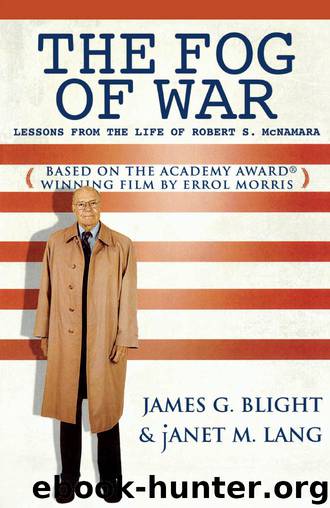The Fog of War by James G. Blight & janet M. Lang

Author:James G. Blight & janet M. Lang
Language: eng
Format: epub
Publisher: Rowman & Littlefield
Published: 2005-02-16T16:00:00+00:00
[Anthony Lewis, Robert S. McNamara and Theodore C. Sorensen, discussion of Kennedy and Vietnam, October 22, 2003.]33
Anthony Lewis: There’s a . . . (inaudible) in the current issue of the Boston Review by James Galbraith . . . the thrust of this one—and it refers to the very meeting [of October 2, 1963] you’ve just mentioned, Bob. The headline of the piece is “Exit Strategy in 1963: JFK Ordered a Complete Withdrawal From Vietnam.” It refers to the joint report of yourself and Maxwell Taylor. And it says that recommendation—it gives the number, so I’ll say it, Section I-B of the McNamara-Taylor Report—recommendations read that a (inaudible)—complete withdrawal be completed by the end of 1965, and that the Defense Department should announce in the very near future, presently prepared plans to withdraw 1,000 of 17,000 military personnel.
Theodore C. Sorensen: That’s absolutely correct.
Robert McNamara: But there was much controversy—this is the point I want to make—[this was] not by any means [the] unanimous view of his advisers. Many, many were opposed to approving a plan to remove all advisers and all military support within two years—by the end of ’65.
Many, many were opposed to withdrawing 1,000 within 90 days. And then after that decision was made, many, many were opposed to announcing it. And the proposal was made to announce it because those who favored the action knew enough about government to understand those who lost would live to fight another day, unless the . . . [decisions to withdraw the 1,000, and to announce the withdrawal] were put in concrete. The way they were put in concrete was to announce it.
And he [President Kennedy] went through those controversies. And the tape is very clear on this. First, the controversy over whether to establish the plan and have it as an official government policy. And second, the controversy over whether to put it in concrete by announcing it. He did both. And as I say, believing as I do now—and I think I understand it better now than I understood it then—that he believed the primary responsibility of a president was to keep the nation out of war if at all possible. I [therefore] do not believe that he would have had 500,000 men in Vietnam.
He [President Kennedy] believed in the domino theory. With hindsight, I think it was wrong. He believed that we would lose. If we were to lose South Vietnam, as Eisenhower said, we’d weaken the security of the West across the world. Eisenhower believed it, Kennedy believed it, I believed it, we all believed it. I think we were wrong.
But despite that he would have withdrawn, because I think he felt—and on this he was wiser than many others—that even if the domino theory was correct [and] the security of the West would be weakened across the world if we lost Vietnam, he believed it was unlikely that we could retain it by the application of external military power. And he was absolutely correct in that.
Download
This site does not store any files on its server. We only index and link to content provided by other sites. Please contact the content providers to delete copyright contents if any and email us, we'll remove relevant links or contents immediately.
| Arms Control | Diplomacy |
| Security | Trades & Tariffs |
| Treaties | African |
| Asian | Australian & Oceanian |
| Canadian | Caribbean & Latin American |
| European | Middle Eastern |
| Russian & Former Soviet Union |
The Secret History by Donna Tartt(19048)
The Social Justice Warrior Handbook by Lisa De Pasquale(12187)
Thirteen Reasons Why by Jay Asher(8893)
This Is How You Lose Her by Junot Diaz(6877)
Weapons of Math Destruction by Cathy O'Neil(6264)
Zero to One by Peter Thiel(5786)
Beartown by Fredrik Backman(5737)
The Myth of the Strong Leader by Archie Brown(5498)
The Fire Next Time by James Baldwin(5431)
How Democracies Die by Steven Levitsky & Daniel Ziblatt(5213)
Promise Me, Dad by Joe Biden(5141)
Stone's Rules by Roger Stone(5081)
A Higher Loyalty: Truth, Lies, and Leadership by James Comey(4951)
100 Deadly Skills by Clint Emerson(4920)
Rise and Kill First by Ronen Bergman(4778)
Secrecy World by Jake Bernstein(4740)
The David Icke Guide to the Global Conspiracy (and how to end it) by David Icke(4701)
The Farm by Tom Rob Smith(4502)
The Doomsday Machine by Daniel Ellsberg(4484)
